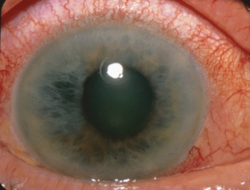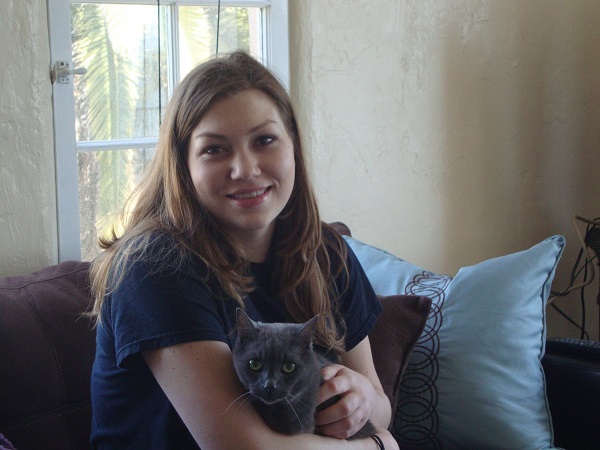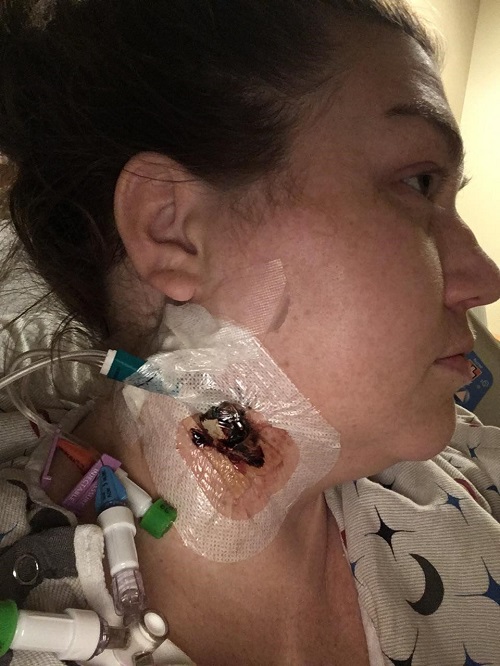Cyclic vomiting syndrome (CVS) is a debilitating disease characterized by episodes of severe nausea and persistent vomiting interspersed with periods of wellness. CVS affects about 2 percent of school-aged children, and also affects adults, although in adults it is often not recognized. Getting a diagnosis can be challenging, and sometimes takes a long time. Episodes of CVS can be extremely debilitating, and are sometimes difficult to treat and require hospitalization.
My daughter has suffered from this disease for 10 years, since she was 2 years old (see her story here). Her episodes were somewhat predictable when she was younger, but have changed and become less predictable, and more difficult to manage with medication, as she gets older. Although we try to avoid triggers such as stress and fatigue, being a pre-teen girl, she likes to have sleepovers with her friends and stay up chatting all night. Unlike other pre-teen girls, however, she suffers the aftereffects of the sleepovers sometimes by vomiting for 24 hours or more.
What Causes Cyclic Vomiting Syndrome?
Although it has long been thought to be related to migraines, many sources state that the cause of cyclic vomiting syndrome is not known. Mechanisms that may be involved include episodic dysautonomia (malfunction of the autonomic nervous system that can result in a variety of symptoms), mitochondrial DNA mutations that cause deficits in cellular energy production, and heightened stress response that causes vomiting. However, there is mounting evidence for the role of mitochondrial dysfunction in the pathogenesis of this disease, a fact that is not often understood by the average practicing gastroenterologist. The connection to mitochondrial dysfunction has important implications for effective treatment of cyclic vomiting syndrome.
Mitochondrial Dysfunction, Cyclic Vomiting and Other Conditions
Mitochondria are small organelles within the cell responsible for energy production and other critical functions. Because of these crucial functions, Dr. Richard Boles, Director of the Metabolic and Mitochondrial Disorders Clinic at Children’s Hospital Los Angeles, explains that “30 years or so ago, many scientists couldn’t believe that mitochondrial disease could exist, because how does the organism survive?” However, mitochondrial dysfunction plays a role in many diseases, including CVS, and according to Dr. Boles:
“these are partial defects. Mitochondrial dysfunction doesn’t really cause anything, what it does is predisposes towards seemingly everything. It’s one of many risk factors in multifactorial disease. It can predispose towards epilepsy, chronic fatigue, and even autism, but it doesn’t do it alone. It does it in combination with other factors, which is why in a family with a single mutation going through the family, everyone in the family is affected in a different way. Because it predisposes for disease throughout the entire system.”
DNA mutations that affect mitochondrial function can occur in the DNA that is found in the nucleus of the cell (genomic DNA), or they can occur in the DNA that is found within the mitochondria themselves. Mitochondrial DNA is inherited differently than nuclear DNA. Most people are familiar with the inheritance of nuclear DNA, in which we have two copies of every gene, and we inherit one copy from each of our parents. However, mitochondrial DNA is inherited exclusively through the mother; therefore, mutations that affect the mitochondrial DNA can be traced through the maternal lineage of a family.
A possible relationship between cyclic vomiting syndrome and mitochondrial dysfunction was suggested by the finding that in some families, CVS was maternally inherited. Mitochondrial DNA mutations and deletions have been reported in patients with CVS, and disease manifestations of mitochondrial dysfunction have been found in the maternal relatives of patients with CVS. In other words, conditions such as migraines, irritable bowel syndrome, depression, and hypothyroidism, are often found in the maternal relatives of patients with CVS.
Mitochondrial DNA mutations don’t cause CVS directly, in the way that a DNA mutation causes cystic fibrosis, for example. In some patients, mitochondrial dysfunction plays a greater role in the causation of their disease, and in other patients, it may be less of a factor. Dr. Boles explains: “In some cases it’s a clear mitochondrial disorder, they have multiple other manifestations and it drives the disease. However, in most patients, it is one of many factors in disease pathogenesis.” Patients with classical mitochondrial disorders have disease manifestations such as muscle weakness, neurological problems, autism, developmental delays, gastrointestinal disorders, and autonomic dysfunction. Some patients with CVS have these other disease manifestations, and some have only CVS symptoms.
Treatment for Cyclic Vomiting Syndrome and Mitochondrial Dysfunction
As with many diseases, understanding as least some of the cause of CVS has allowed for the development of treatments tailored towards fixing the root cause. Co-enzyme Q10 and L-carnitine are two dietary supplements that have been used to treat a wide variety of conditions. Both supplements may be able to assist the mitochondria with energy production and thus, help compensate for mitochondrial dysfunction. A retrospective chart review study found that using these two supplements, along with a dietary protocol of fasting avoidance (having three meals and three snacks per day), was able to decrease the occurrence of, or completely resolve, the CVS episodes in some patients. In those patients who didn’t respond to treatment with supplements alone, the addition of amitriptyline or cyproheptadine, two medications that have been used for prevention of CVS episodes, helped to resolve or decrease the episodes. Treatment with the cofactors alone was well tolerated with no side effects, and treatment with cofactors plus amitriptyline or cyproheptadine was tolerated by most patients. Therefore effective treatment for prevention of CVS episodes does exist, although it may not be widely employed by most gastroenterologists.
My daughter is currently trying to treat her CVS with the combination of co-enzyme Q10 and L-carnitine. So far she hasn’t experienced any side-effects, and over the next few months we will see if she experiences a decrease or even a complete cessation of her episodes. My hope for her is that she won’t have to choose between missing out on a fun night with her friends, and being able to be functional for the rest of the weekend. Maybe she can be like every other teenager and go to a sleepover, and just be grumpy the next day, instead of spending the next day vomiting and lying on the bathroom floor in pain.
Dr. Richard Boles, MD: Dr. Boles completed medical school at UCLA, a pediatric residency at Harbor-UCLA, and a genetics fellowship at Yale. He is board certified in Pediatrics, Clinical Genetics and Clinical Biochemical Genetics. His current positions include Associate Professor of Pediatrics at the Keck School of Medicine at USC, an attending physician in Medical Genetics at Children’s Hospital Los Angeles, and Medical Director of Courtagen Life Sciences. Dr. Boles practices the “bedside to bench to bedside” model of a physician-scientist, combining an active clinical practice in metabolic and mitochondrial disorders with clinical diagnostics (DNA testing) and research. Dr. Boles’ clinical and research focus is on polymorphisms (common genetic changes) in the DNA of genes involved in energy metabolism, and their effects on the development of common functional disorders. Examples include migraine, depression, cyclic vomiting syndrome, complex regional pain syndrome, autism and SIDS. He has 50 published papers on mitochondrial disease.
Postscript: Using this advice, we were able to manage my daughter’s vomiting. Here is the follow-up story.
We Need Your Help
More people than ever are reading Hormones Matter, a testament to the need for independent voices in health and medicine. We are not funded and accept limited advertising. Unlike many health sites, we don’t force you to purchase a subscription. We believe health information should be open to all. If you read Hormones Matter, like it, please help support it. Contribute now.
Yes, I would like to support Hormones Matter.
This article was first published on January 28, 2014.



















